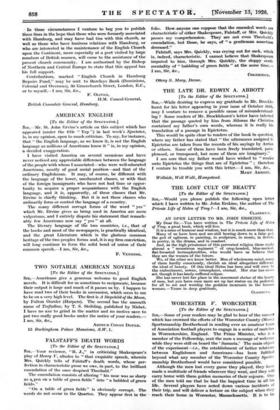AMERICAN ENGLISH [To the Editor of the SPECTATOR.] Szn,—Mr. St.
John Ervine's article on this subject which has appeared (under the title " Yep ") in last week's Spectator, is, in my opinion, open to much criticism. To say, for instance, that " the English language, as we know it, is not the English language as millions of Americans know it " is, in my opinion, a decided exaggeration.
I have visited America on several occasions and have never noticed any appreciable difference between the language of the people with whom I associated—who were well-educated Americans, mostly of good social position—and that of the ordinary Englishman. It may, of course, be different with the language of the lower, uneducated classes, or with that of the foreign immigrants who have not had time or oppor- tunity to acquire a proper acquaintance with the English language, and it is, apparently, of these classes that Mr. Ervine is chiefly thinking. But it is not these classes who ordinarily form or control the language of a country.
The many different corrupt forms of the word " yes" which Mr. Ervine gives as being used in America are mere vulgarisms, and I entirely dispute his statement that remark- ably few Americans now say ". yes " at all. The literary language of the two countries, i.e., that of the books and most of the newspapers, is practically identical, and the great Literature which is the glorious common heritage of the two peoples forms and, it is my firm conviction, will long continue to form the solid bond of union of their common speech.—I am, Sir, &c., F. YENNING.














































 Previous page
Previous page